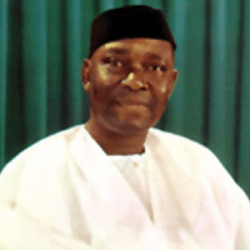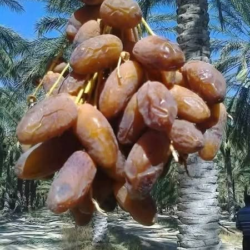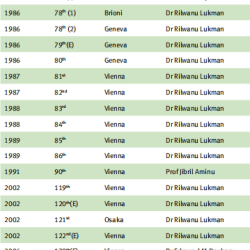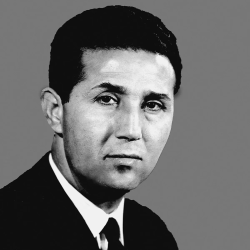The presidents of Nigeria from 1960 to date are:
- Nnamdi Azikiwe (1 October 1963 to 16 January 1966)
- General Johnson Aguiyi-Ironsi (16 January 1966 to 29 July 1966)
- General Yakubu Gowon (1 August 1966 to 29 July 1975)
- General Murtala Mohammed (29 July 1975 to 13 February 1976)
- General Obasanjo Olusegun (13 February 1976 to 1 October 1979)
- Shehu Shagari (1 October 1979 to 31 December 1983)
- General Muhammadu Buhari (31 December 1983 to 27 August 1985)
- General Ibrahim Babangida (27 August 1985 to 26 August 1993)
- Ernest Shonekan (26 August 1993 to 17 November 1993)
- General Sani Abacha (17 November 1993 to 8 June 1998)
- General Abdulsalami Abubakar (8 June 1998 to 29 May 1999)
- Olusegun Obasanjo (29 May 1999 to 29 May 2007)
- Umaru Musa Yar-Adua (29 May 2007 to 5 May 2010)
- Goodluck Ebele Jonathan (29 May 2010 to 29 May 2015)
- Muhammadu Buhari (29 May 2015 to 29 May 2023)
- Bola Tinubu (29 May 2023 to …)

• Nnamdi Azikiwe (1 October 1963 to 16 January 1966)

• General Johnson Aguiyi-Ironsi (16 January 1966 to 29 July 1966)

• General Yakubu Gowon (1 August 1966 to 29 July 1975)

• General Murtala Mohammed (29 July 1975 to 13 February 1976)

• General Obasanjo Olusegun (13 February 1976 to 1 October 1979)

• Shehu Shagari (1 October 1979 to 31 December 1983)

• General Muhammadu Buhari (31 December 1983 to 27 August 1985)

• General Ibrahim Babangida (27 August 1985 to 26 August 1993)

• Ernest Shonekan (26 August 1993 to 17 November 1993)

• General Sani Abacha (17 November 1993 to 8 June 1998)

• General Abdulsalami Abubakar (8 June 1998 to 29 May 1999)
• Olusegun Obasanjo (29 May 1999 to 29 May 2007)

• Umaru Musa Yar-Adua (29 May 2007 to 5 May 2010)

• Dr Goodluck Ebele Jonathan (29 May 2010 to 29 May 2015)
• Muhammadu Buhari (29 May 2015 to 29 May 2023)

• Bola Tinubu (29 May 2023 to …)
Nigeria past presidents. From current to first
- Bola Tinubu (29 May 2023 to …)
- Muhammadu Buhari (29 May 2015 to 29 May 2023)
- Goodluck Ebele Jonathan (29 May 2010 to 29 May 2015)
- Umaru Musa Yar-Adua (29 May 2007 to 5 May 2010)
- Olusegun Obasanjo (29 May 1999 to 29 May 2007)
- General Abdulsalami Abubakar (8 June 1998 to 29 May 1999)
- General Sani Abacha (17 November 1993 to 8 June 1998)
- Ernest Shonekan (26 August 1993 to 17 November 1993)
- General Ibrahim Babangida (27 August 1985 to 26 August 1993)
- General Muhammadu Buhari (31 December 1983 to 27 August 1985)
- Shehu Shagari (1 October 1979 to 31 December 1983)
- General Obasanjo Olusegun (13 February 1976 to 1 October 1979)
- General Murtala Mohammed (29 July 1975 to 13 February 1976)
- General Yakubu Gowon (1 August 1966 to 29 July 1975)
- General Johnson Aguiyi-Ironsi (16 January 1966 to 29 July 1966)
- Nnamdi Azikiwe (1 October 1963 to 16 January 1966)
| 1 | Bola Tinubu (29 May 2023 to …) |
| 2 | Muhammadu Buhari (29 May 2015 to 29 May 2023) |
| 3 | Goodluck Ebele Jonathan (29 May 2010 to 29 May 2015) |
| 4 | Umaru Musa Yar-Adua (29 May 2007 to 5 May 2010) |
| 5 | Olusegun Obasanjo (29 May 1999 to 29 May 2007) |
| 6 | General Abdulsalami Abubakar (8 June 1998 to 29 May 1999) |
| 7 | General Sani Abacha (17 November 1993 to 8 June 1998) |
| 8 | Ernest Shonekan (26 August 1993 to 17 November 1993) |
| 9 | General Ibrahim Babangida (27 August 1985 to 26 August 1993) |
| 10 | General Muhammadu Buhari (31 December 1983 to 27 August 1985) |
| 11 | Shehu Shagari (1 October 1979 to 31 December 1983) |
| 12 | General Obasanjo Olusegun (13 February 1976 to 1 October 1979) |
| 13 | General Murtala Mohammed (29 July 1975 to 13 February 1976) |
| 14 | General Yakubu Gowon (1 August 1966 to 29 July 1975) |
| 15 | General Johnson Aguiyi-Ironsi (16 January 1966 to 29 July 1966) |
| 16 | Nnamdi Azikiwe (1 October 1963 to 16 January 1966) |
Nigeria past presidents. From first to current
- Nnamdi Azikiwe (1 October 1963 to 16 January 1966)
- General Johnson Aguiyi-Ironsi (16 January 1966 to 29 July 1966)
- General Yakubu Gowon (1 August 1966 to 29 July 1975)
- General Murtala Mohammed (29 July 1975 to 13 February 1976)
- General Obasanjo Olusegun (13 February 1976 to 1 October 1979)
- Shehu Shagari (1 October 1979 to 31 December 1983)
- General Muhammadu Buhari (31 December 1983 to 27 August 1985)
- General Ibrahim Babangida (27 August 1985 to 26 August 1993)
- Ernest Shonekan (26 August 1993 to 17 November 1993)
- General Sani Abacha (17 November 1993 to 8 June 1998)
- General Abdulsalami Abubakar (8 June 1998 to 29 May 1999)
- Olusegun Obasanjo (29 May 1999 to 29 May 2007)
- Umaru Musa Yar-Adua (29 May 2007 to 5 May 2010)
- Goodluck Ebele Jonathan (29 May 2010 to 29 May 2015)
- Muhammadu Buhari (29 May 2015 to 29 May 2023)
- Bola Tinubu (29 May 2023 to …)
| 1 | Nnamdi Azikiwe (1 October 1963 to 16 January 1966) |
| 2 | General Johnson Aguiyi-Ironsi (16 January 1966 to 29 July 1966) |
| 3 | General Yakubu Gowon (1 August 1966 to 29 July 1975) |
| 4 | General Murtala Mohammed (29 July 1975 to 13 February 1976) |
| 5 | General Obasanjo Olusegun (13 February 1976 to 1 October 1979) |
| 6 | Shehu Shagari (1 October 1979 to 31 December 1983) |
| 7 | General Muhammadu Buhari (31 December 1983 to 27 August 1985) |
| 8 | General Ibrahim Babangida (27 August 1985 to 26 August 1993) |
| 9 | Ernest Shonekan (26 August 1993 to 17 November 1993) |
| 10 | General Sani Abacha (17 November 1993 to 8 June 1998) |
| 11 | General Abdulsalami Abubakar (8 June 1998 to 29 May 1999) |
| 12 | Olusegun Obasanjo (29 May 1999 to 29 May 2007) |
| 13 | Umaru Musa Yar-Adua (29 May 2007 to 5 May 2010) |
| 14 | Goodluck Ebele Jonathan (29 May 2010 to 29 May 2015) |
| 15 | Muhammadu Buhari (29 May 2015 to 29 May 2023) |
| 16 | Bola Tinubu (29 May 2023 to …) |
Nigeria
Nigeria is a country in Africa, a regional power on the continent and an emerging power on the international scene.

It has 36 states and a Federal Capital Territory, Abuja.
Having being divided into states, the country is further divided into 774 Local Government Areas (LGAs).
The LGAs are under the control of their respective states.
The country has the largest economy in Africa.
Nigeria’s population is over 230 million, making it number 1 most populated country in Africa, and number 6 in the world.

It covers an area of 923,769 square kilometres (356,669 sq mi).
It is situated between the Sahel to the north and the Gulf of Guinea to the south in the Atlantic Ocean.

Nigeria borders Niger in the north, Chad in the northeast, Cameroon in the east, and Benin in the west.
It is often referred to as the Giant of Africa owing to its large population and economy and is considered to be an emerging market by the World Bank.

However, the country ranks very low in the Human Development Index and remains one of the most corrupt nations in the world.

The largest city in Nigeria is Lagos, one of the largest metropolitan areas in the world and the largest in Africa.

Nigeria is a multinational state inhabited by more than 250 ethnic groups speaking 500 distinct languages, all identifying with a wide variety of cultures.
The official language is English, chosen to facilitate linguistic unity at the national level.
Nigeria is a founding member of AU (African Union) and a member of other international organizations including UN (United Nations), Commonwealth of Nations and ECOWAS (Economic Community of West African States).







